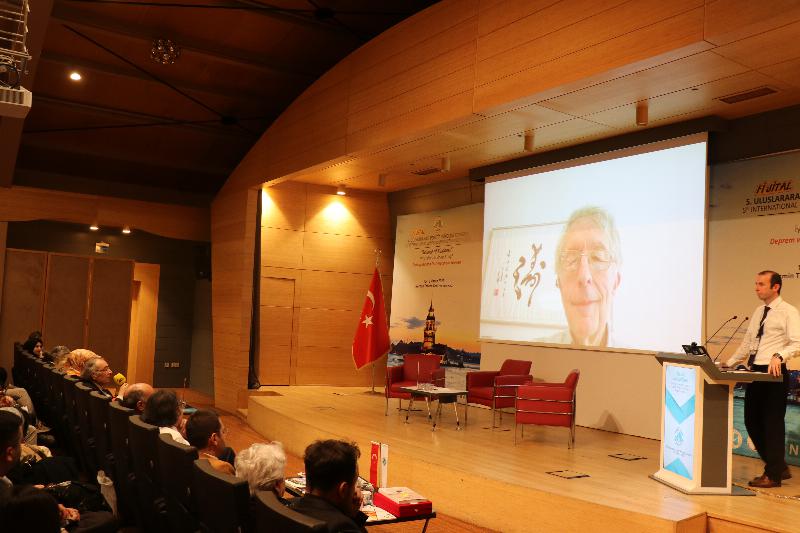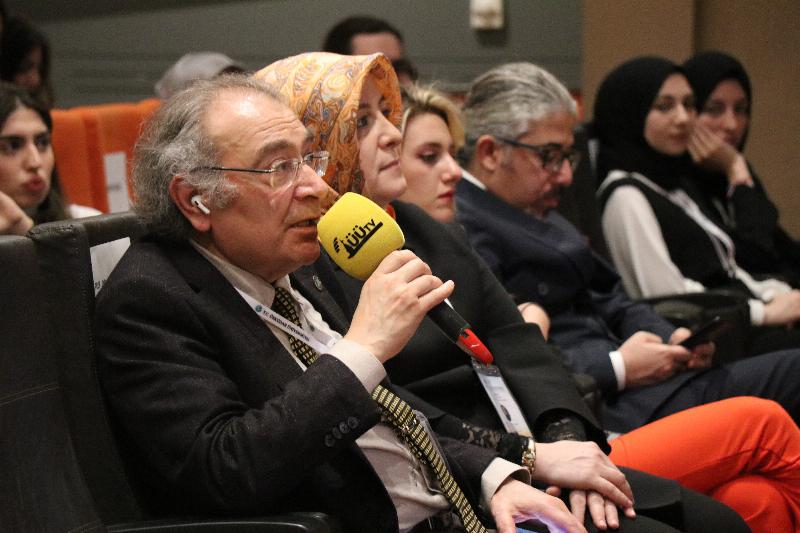This year, the guest of honor was renowned worldwide scientist Prof. Howard Gardner in the 5th International Congress of Positive Psychology organized by Üsküdar University with the theme of “The Science of Kindness/ What Does Kindness Yield? & "Earthquake and Post-Traumatic Growth”. Prof. Howard Gardner from Harvard University evaluated the relationship between neuroscience and the theory of multiple intelligences. Prof. Gardner said that concepts such as the metaverse may make people's lives easier in the future, but it may not be easy for people to stay human, that is, to do good things. Gardner also made evaluations about the chatGPT application.
The 5th International Positive Psychology Congress hosts experts working in this field, which is organized by Üsküdar University with the partnership among Üsküdar University, NPİSTANBUL Hospital, NP Etiler & Feneryolu Medical Center, Turkish Psychological Counseling and Guidance Association and Positive Psychology Institute.
He conveyed his best wishes to Türkiye
The honored guest of the three-day congress was Prof. Howard Gardner.
Attending the congress online, American psychologist Prof. Howard Gardner expressed his sadness about the earthquakes that took place in Kahramanmaraş on February 6 in his interview titled “The Science of Goodness, The Theory of Multiple Intelligences” and conveyed his best wishes. Prof. Howard Gardner said, “On behalf of all humanity, I would like to say: I hope there will be a good recovery. Of course, this recovery will take some time and we will have to work on it, of course, but you know, an important part of building resilience is being able to move on, and this conference will be very important in this context.”.
Known for his theory of multiple intelligences, Prof. Howard Gardner said that his colleagues and Gardner have recently focused on concepts such as ethics, morality and goodness. Prof. Howard Gardner evaluated the benefits of the concepts of kindness and goodness in post-traumatic recovery, which is the subject of the congress.
Respect, morality and ethics are different concepts
Noting that there is a difference between the concepts of respect, morality, morale and ethics, Gardner said, “Respect is something that includes courtesy, that is, it is about being kind to the people around us. However, what we call morality, for example, is about how you get along with the people living in your neighborhood. Think of it like the 10 commandments: You shall not steal, you shall not kill, you shall not lie, you shall respect your family. In other words, you will treat other people as you would like to be treated. What we call ethics is about how you behave in very difficult professional conditions, that is, you can be a teacher, a doctor and there may be situations where you may encounter ethical values. Let me give an example from teaching, for example, you have 30 students, one of them has very destructive behaviors. You can kick the student out of the class, however, would not be that student feel banned at a very early age? Or you can devote all your time to this student, then you steal from the time of 29 students. So, there is no simple answer. In positive psychology we need to distinguish between respect, local morals, ethics and professional rules.”.
Maybe the metaverse will help, but staying human will not be easy.
Prof. Tarhan asked his views on this situation. Prof. Howard Gardner said, “What we call a human being is an evolutionary and anthropological question. We have come to this state after thousands of years of evolution. How can we all be a better person? we ae all already working on it. What are the characteristics of being a good person? This is one of the points that positive psychology focuses on. How do we develop this side of ourselves? I think the point where I differ from some positive psychologists is that: How do we make people more honest, kinder, more ethical? We do not have a golden recipe for this. We need to discuss this. Maybe computers and artificial intelligence will help us. Maybe the metaverse will help us, however, I share your skepticism at this point. It will not be easy for people to stay human, to do good things. In a world dominated by so many computer systems. Girls between the ages of 12 and 15 are the most depressed in the US. Then, the boys of the same age follows this. These are young people and the leading cause of depression is the pandemic and social media. It is so hard for girls that they constantly compare themselves to someone else, maybe to 'perfect' girls. Therefore, this humanity issue will perhaps be the subject of constant discussion in the next century.”.
There is data in neuroscience that actually supports the theory of multiple intelligences
Evaluating the relationship between neuroscience and the theory of multiple intelligences, Prof. Howard Gardner said, “Multiple intelligence theory is actually a critical concept. If you look at the French school, there is only one intelligence. This can be tested with IQ tests. So there is a point of view that if you are good at something, you are good at everything. There was a school that held the view that if you perform poorly at one thing, you will be bad at everything else. One child may learn languages well, another child may be good at math, another may have good musical skills. I define them as different intelligences. Of course, knowledge is very important in the theory of multiple intelligences. I have also worked with patients with brain damage. There are also examples that show that there is no single intelligence because it can distinguish skills according to damage in various parts of the brain. There is empirical data in neuroscience that actually supports the theory of multiple intelligences, however, studies on the brain have improved a lot in recent years. Now, for example, when which neurocircuits receive different stimuli, it can be a picture, a sound… We know how they function differently. In the future, we will likely understand more clearly how different parts of the brain relate to different cognitive abilities. This will perhaps develop the theory of multiple intelligences and cause it to evolve. It is likely that your perception of yourself and your perception of others will change. We are now beginning to understand the intelligence of animals better. We did not know before.".
The epitaph on my tombstone may read 'Gardner stood against the notion that there is just one type of intelligence'
Noting that computers and artificial intelligence systems can perform tasks such as linguistic tasks better than humans, Gardner said, “We will not only receive information from the brain, maybe we will also evaluate information from other animals. It is stated that artificial intelligence is starting to become even more intelligent and creative. This will perhaps further complicate our knowledge and repertoire. If I die any time soon, the epitaph on my tombstone may read, ‘Howard Gardner stood against the notion that there is just one type of intelligence’. Honestly, it is okay for me too.".
We do not know if AI will develop an emotional structure in the future
Prof. Howard Gardner, regarding how he evaluates the developments regarding artificial intelligence and chatGPT application, said, “Lastly, I read the article written by Noam Chomsky with his valuable colleagues. Chomsky is one of the world's leading intellectuals, but I have to say that: The majority of this article has a perspective that also reflects Humanism. However, it seems very simple to me to come to the following conclusion: When people deal with ambiguities, confusion, complex issues, they give an emotional response, and there is a point of view that artificial intelligence does not. I can agree on this, but we cannot be so sure. We cannot be certain that this is the case. We write computer systems, they can solve ambiguous problems. We do not know whether they will develop an emotional structure like a human. We do not know right now. If you ask my opinion about Chat GPT as an educator, I have to say that I do not fully agree with Chomsky's theory of intelligence.”.
Rather than teaching children and young people the science of kindness, it is more effective to be an example and a role model for them
Regarding the relationship between moral intelligence and consciousness, Prof. Howard Gardner said, “I do not believe that there is such a thing in terms of the concepts of intelligence that I have defined. What we call intelligence is a bit more compulsive system. It can be a language computer, a music computer, or a spatial computer. How we use it has a moral dimension. For example, Hitler is an expert on the German language and used it very destructively. Goethe is a connoisseur of the German language, he used it very constructively. Intelligence is not inherently immoral. You can use it constructively or destructively.”. Prof. Howard Gardner said that he believed it would be more effective to be an example and a role model for children and young people, rather than teaching them the science of kindness.
He will give an online conference from Ukraine
Important scientists will also give conferences on the second and third days of the congress. Prof. Daria Suprun from Dragomanov University of Ukraine, who will attend online from Ukraine, will also give a conference titled "Professional Identity and Social Values: Synergy of Education and Spirituality". Üsküdar University NPİSTANBUL Hospital Neurology Specialist Prof. Oğuz Tanrıdağ will also attend the congress with a conference titled “Neuroscientific Foundations of Positive Psychology”. On the last day of the conference, NPİSTANBUL Hospital Specialist Clinical Psychologist Özgenur Taşkın with a conference titled "The Relationship between Self Compassion and Conscious Awareness" and Üsküdar University Asst. Prof. Fatma Turan with a conference titled “The Voice of Hope: Silent Kindness” will also attend.
Üsküdar News Agency (ÜNA)



